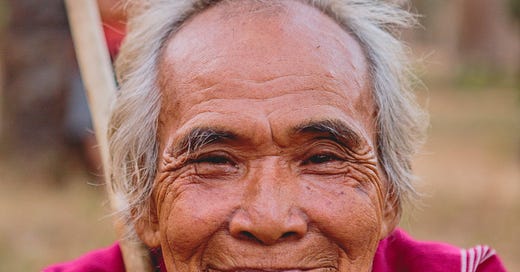I’m usually a pretty easygoing guy, the kind who lets most of life’s aggravations and mini aggressions roll off my back. But one thing I cannot abide is seeing a person treated as less worthy than others. Particularly when the person in question is me.
I am talking about ageism, that insidious belief that you can measure a person’s worth by their number of years on the planet. Less than 18, and they lack the experience to make good decisions or have valid ideas. More than 65, and they’re irrelevant anachronisms ready to be put out to pasture. (For a comprehensive, clear overview of ageism, I recommend Tracy Gendron’s book Ageism Unmasked: Exploring Age Bias and How to End It.)
Some ageism is innocent and well-meaning. When a grocery cashier asks if I need help carrying my groceries to the car, I appreciate her desire to give great customer service; still, I need her to understand that this customer is not yet so over-the-hill that he can’t carry two bags to his car. Some ageism is well-meaning but oblivious, as when the daughter says to her octogenarian mother at the restaurant, “Are you sure you want to order the steak? It might be hard for you to chew. You should have the soup.”
Age Discrimination
But then there’s age discrimination that’s blatant and in plain view. It’s the discrimination patients feel when doctors don’t take their symptoms seriously and tell them it’s just normal aging. It’s the discrimination in Hollywood that all but bans women over 35 from being cast as romantic leads, and relegates these actresses to no future screen roles except as doddering grandmothers. It’s the discrimination of an advertising industry that rarely depicts older adults at all, and then only as caricatures in need of help and pity. It’s the discrimination – and exploitation – of the anti-aging cosmetics industry, which rakes in more than $50 billion annually by convincing women (mostly) that they cannot succeed in love, work, or life unless they conceal all evidence of aging.
Growing older wouldn’t be so bad, really, were it not for all these voices hectoring us that reaching advanced years is a weakness, a deficit, a disease, and a problem that should make us afraid or ashamed.
And do you know what’s the worst part of ageism? It’s that deep in our subconscious, we accept some of these lies as the truth. How could we not, given a steady volley of ageist messages every day for our entire lives? Advertising industry sources estimate that the average person is bombarded with between 6,000 and 10,000 advertisements daily. (That’s up from 500 to 1,600 ads daily back in the 1970s, before the digital media explosion.) It’s inevitable that some portion of that tsunami of anti-aging ideas will enter our brains and become part of what we accept as reality.
Trash Talk
The only way I know to free our own minds of ageism and feel positive about what is, after all, a natural and inevitable part of life, is to perceive these voices for what they are - trash talk.
Trash talk, if you’re not plugged in to current vernacular, is an insult that one competitor tosses at an opponent to put him off his game. Muhammad Ali was a master of it, and he wielded it as effectively as his fists.
When Estee Lauder, Eve Arden, and other brands promise to “turn back the clock” by clearing away wrinkles and other “signs of aging,” that’s trash talk. That’s telling older women that aging is a threat to their livelihood and their sexuality. And it’s bullshit.
When physicians tell older patients their symptoms are normal for their age or all in their head, that’s trash talk. That’s telling patients that aging is an inevitable state of decline and decrepitude and they don’t deserve to be taken seriously. And it’s bullshit.
When retirement communities suggest that “active seniors” will feel right at home surrounded by others of similar age, safe and separated from the concerns of the world of younger people, that’s trash talk. That’s an excuse to separate older adults from a society that acts as if it has no further use for them. And it’s bullshit.
For us to stop internalizing the trash talk about growing older, we need to recognize how pervasive it is. We also have to remember that there is an alternate narrative: Age is a blessing that not all of us are privileged to enjoy. We older adults cannot be stereotyped. Many of us continue to lead productive, creative, meaningful lives, and with good health and good luck we can continue to do that for decades. Our “retirement date” is not our sell-by date; we still have a lot of life to live.
Recognize the trash talk for what it is, and shut it down. Do not let anyone tell you that your age makes you less than anyone else.
Was your transition to retirement bumpy?
I want to interview people about their own retirement experience for a book I’m researching. If you care to share your story, please email me at don@donakchin.com to set up a remote interview.





Joe Biden showed the whippersnappers a thing or two at the SOTU, rope-a-doping the young dopes in the GOP. Dark Brandon - nice, old man!
What a smart, succinct description of ageism's causes and manifestations. Yes, let's turn off the trash talk in our own heads and call it out when you hear it from others. This week a 70-ish neighbor told me her usual advice to young people is, "Don't get old!" (Yikes, I wondered, did she recommend dying young?)